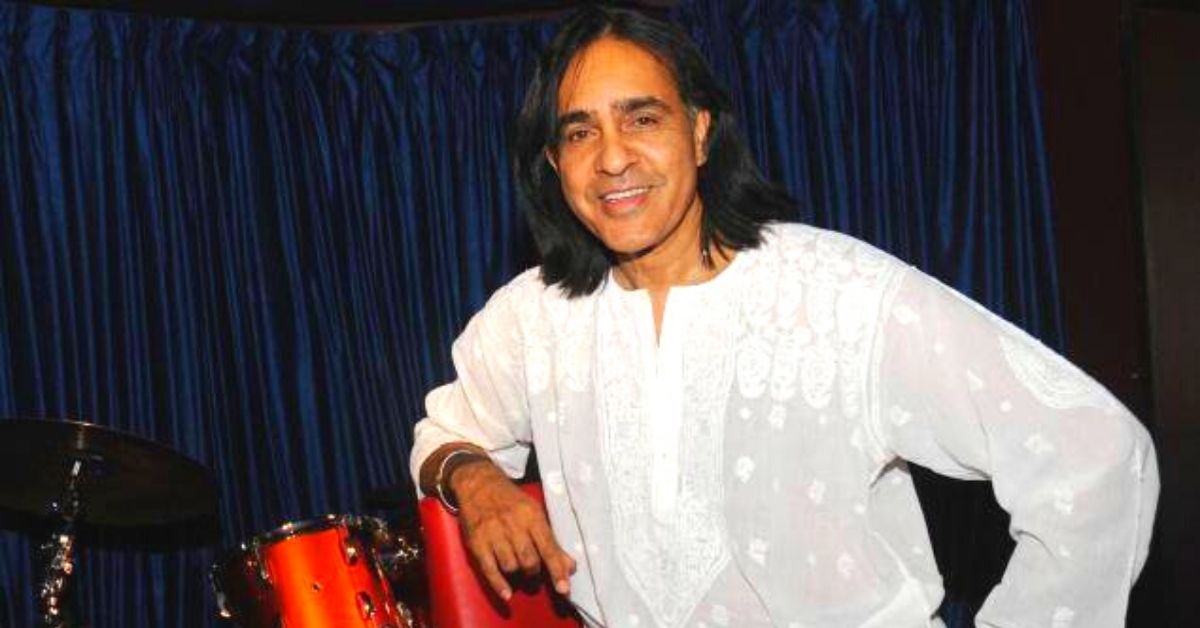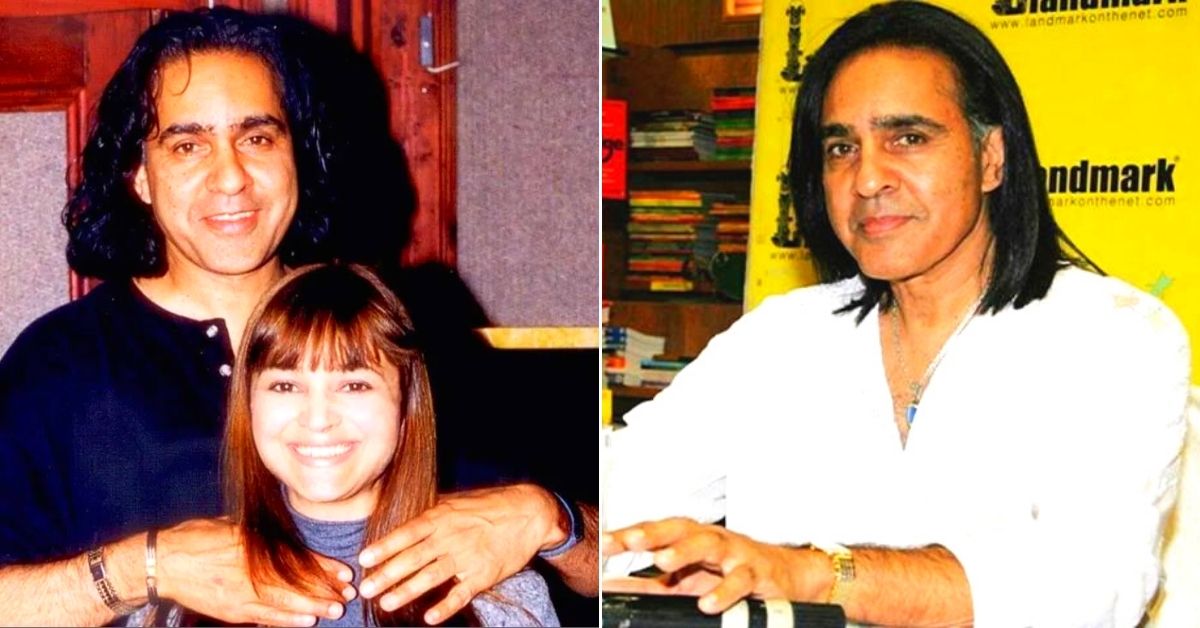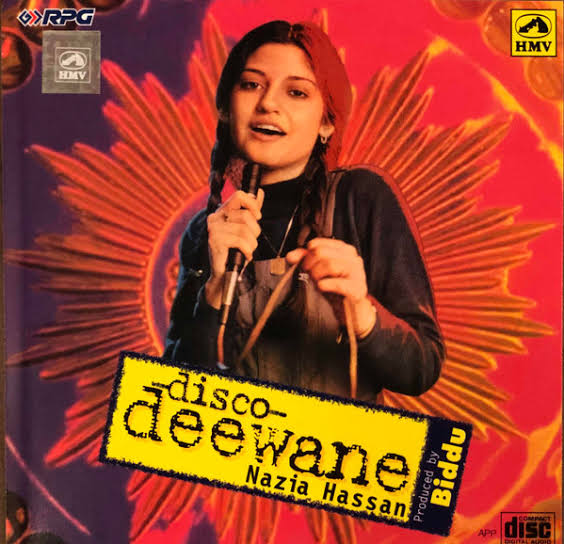
Arriving in London during the late ’60s with just his guitar, Biddu Appaiah went on to become a globally renowned music producer who sold millions of records. Here’s his story.
What do the songs ‘Kung Fu Fighting’, ‘Aap Jaisa Koi’, ‘Disco Deewane’ and ‘Made in India’ have in common? Apart from selling millions of copies worldwide, these records serenaded audiences from Russia to Peru, and stood as pioneers of global disco and pop music from the Indian subcontinent. (Image courtesy Facebook/Biddu)
What also binds them is the fact that they were all produced by a man from Bengaluru who left for London in the Swinging Sixties to pursue his love for popular Western music.
It’s incredible that more people in India don’t know Biddu Appaiah and his remarkable contributions to music. A great deal of the pop music Indians listen to today can trace their roots to the songs he produced. It was his production chops that not only introduced the world to artists like Carl Douglas, Nazia Hassan, Alisha Chinai and Shaan, but also opened commercial avenues for other independent talent in India who didn’t require the backing or endorsement of the Hindi film industry (Bollywood) producers or already established cinestars.
The Hindi film industry fought to wrest control back from the music labels supporting independent artists, but the onset of the internet has revived that spirit of independence. Here’s the brief story of a man, music producer and composer who left India behind to follow his dreams, but found his way back to influence generations of artists.

‘Everybody Was Kung-Fu Fighting’
Born on 8 February 1944 in Bengaluru, Biddu attended the Bishop Cottons Boys’ School. Growing up listening to pop music from the West on the popular radio station Radio Ceylon (of Sri Lanka), his major musical influences as a teenager were Elvis Presley, The Beatles and The Rolling Stones. Learning how to play the guitar, he eventually formed a band with his friend Ken Gnanakan called the Trojans at 16.
They would play in small clubs, weddings, private parties and bars across Bengaluru before graduating to gigs in other cities like Kolkata and Mumbai. As an English-speaking band, they made their name by largely playing cover versions of songs by The Beatles, The Rolling Stones, Trini Lopez, and other Western music stars of the day. However, once the group split up, Biddu briefly performed as the lone ‘Trojan’ before leaving for England in the late 1960s.
Embarking on a journey to England in 1967, Biddu first made his way to the Middle East by climbing on a Haj ship in 1967 to Mecca before hitchhiking across the Middle East, where he performed multiple gigs.
In a 2020 interview with the Deccan Herald, he recalled, “I wanted to make it in the West. India in the 60s was a poor country; we were dancing with Russia instead of rocking with the West. I needed to get out of India as my interest was Western pop music; I was never into Bollywood. I left India and walked all the way to Beirut, singing there for six months until I saved enough moolah [money] to get to England.”
About his arrival in England, he once said in an interview with the BBC, “I didn’t really know too much about England or anything – I’d just come here on the chance of meeting the Beatles and doing some music. Everything that I did had this danceable flavour.”
To support his dreams of becoming a singer, he worked odd jobs, including one as a chef in London to save up enough money for studio time. He eventually cut a single, which impressed nobody and recalled “as an Indian in those days, they were happier to hire me as an accountant than as a singer”.
Realising that he wasn’t going to make it as a singer signed on a major record label, he instead decided to produce his own records, which, in the early days, didn’t generate much success. His first major success came in 1969, when he produced a song called ‘Smile for Me’ written by Barry and Maurice Gibb of the Bee Gees and performed by a Japanese band called The Tigers.
Since members of the band couldn’t speak English at the time, Biddu taught them how to sing English songs phonetically, given his knowledge of the language and love for pop music. The song topped the charts in Japan, and its success was the breakthrough he needed in England.
Entering the 1970s, he was producing a variety of disco songs that received little airplay on radio, but found underground appreciation from fans in the north of England.
His first real moment of success and mass acclaim came when he began working with Jamaican-born musician Carl Douglas in 1972. As a 2020 Financial Times article recollects, “Douglas was recording ‘I Want to Give You My Everything’ (written by Larry Weiss), which they did in a few hours. There was little time left to record a B-side. Douglas proposed ‘Kung Fu Fighting’, which he had written after seeing youngsters doing mock-kung fu moves in the street. It was recorded in a couple of takes. Biddu added the ‘Hurgh! Hurgh!’ exclamations. The record company people heard it and instantly realised that the B-side was the hit. They were right — ‘Kung Fu Fighting’ became one of the biggest-selling singles of all time.”
From here, there was no looking back. Biddu would soon establish himself as an important producer in the UK soul and disco scenes in the 1970s, working with a variety of artists including Tina Charles and Jimmy James. The songs he produced made their way to the UK Singles Chart and Billboard 100, while he continued making his own critically acclaimed music with ‘The Biddu Orchestra’.
‘Aap Jaisa Koi’
Biddu was never truly interested in doing film soundtracks, according to his autobiography ‘Made in India: Adventures of a Lifetime’. But that changed when Feroz Khan, a renowned Hindi cinema actor and producer, came to London to meet him in 1979.
Feroz had heard his instrumental albums and wanted him to produce a song for a film he was making called ‘Qurbani’. They met at an apartment he was renting near Claridges Hotel in Mayfair, and what ensued would change Indian pop music forever.
The Bollywood actor’s sales pitch was pretty simple, even though Biddu admittedly knew little of Hindi films or music. Feroz said, “Listen, you and I come from Bangalore. We are both Bangalore boys.” Biddu observed that Feroz was using the “old boys from the hood routine”. Feroz would then go on to say, “Come on, do it for a friend. Your mama will be so pleased.”
Although Biddu initially agreed to take on the project, he was still not convinced, even though Feroz had gone out on a limb for him. Local music directors in Mumbai had threatened to organise a boycott of his film if he “used a foreigner” to make music for one of the songs. However, once Feroz agreed to Biddu’s wish to record the song in London and not use playback singers dominating the music charts in India, there was no looking back.
The next thing they had to do was find a singer in London who could sing in Hindi. That’s when Feroz Khan came up with the name of a young 15-year-old Pakistani girl living in London called Nazia Hassan. Feroz knew her parents well and convinced them to let their daughter sing one song for his film. A couple of days later Biddu met the young Nazia, her brother Zoheb and their parents at their apartment in Century Court opposite the famous Lord’s Cricket Ground.
After singing a verse and chorus from one of Biddu’s songs ‘Dance Little Lady’, Nazia got the gig and went on to record the timeless ‘Aap Jaisa Koi Meri Zindagi Mein Aaye’.
“Her voice did not have the piercing sharpness of most Asian singers. The pleasantness in her voice was around C3, from middle C to G4 — warm, expressive and nubile. It wasn’t a great voice. But it was different, and it was this that made the difference between using her and someone from the old school in India,” wrote Biddu in his autobiography.
After recording Nazia’s part, he went into Red Bus Studios and added some of his magic dust alongside his sound engineer Richard Dodd.
“I had a catchy introductory riff played on the sitar; I used the syn drums, which had never been used in a Hindi song before. The syn drum made a sound not unlike my name. It went ‘bidoo’ every time you hit it and I double-tracked Nazia’s voice to give it some oomph. Once again, I used a rhythm box with a Latin beat to give it a hip-swaying groove,” he wrote.
‘Made in India’
Suffice to say, the song became a raging hit in not just India, but around the world. Despite its massive success, Bollywood didn’t come calling immediately. Instead, about a year later, a representative from the London branch of HMV (later called SaReGaMa), one of India’s largest music companies, came to see him. The record executive expressed the company’s desire for Biddu to make an album with Nazia Hassan. This was the first non-film album the company was going to make. After much negotiation, which also included the payment of royalties to the artists involved, he got into the studio with Nazia and Zoheb to produce an Urdu album.
Modelling the siblings on another famous brother-sister duo in the United States called ‘The Carpenters’ they recorded the album ‘Disco Deewane’, which was a smash hit across the world with the record charting across 14 countries, including Brazil, where it went No.1. The record sold almost 100,000 copies on the day of its release, a remarkable feat for South Asian music artists in the West. Following ‘Disco Deewane’, they went onto work on three more albums including ‘Star/Boom Boom’ in 1982, ‘Young Tarang’ in 1984 and ‘Hotline’ in 1987.

Together, the brother-sister duo went on to sell 60 million records worldwide. During this period, he also made massive hit records for famous Japanese (Akina Nakamori), Chinese and Filipino pop stars as well, besides making a return to the UK music scene with house music records.
After spending about a decade making records with Nazia and Zoheb, he worked with Hindi vocalist Shwetta Shetty producing her 1993 album ‘Johnny Joker’.
But it was 1995 that Biddu really made his mark in India, composing and producing the legendary ‘Made in India’ album by Hindi pop and playback singer Alisha Chinai. The song and the music video that followed was one of the key avenues MTV chose to launch their channel in India.
Interestingly, some anecdotes even claim that the song was originally meant for Nazia on the vocals, but she apparently refused. Eventually the song fell on Alisha China’s lap and for the backup vocals, Biddu employed another young budding singer, Sophie Chaudhary.
opping the charts in India, the album sold over five million copies. In addition to Alisha Chinai, he kickstarted the pop music careers of artists like Shaan, his sister Sagarika Mukherjee and even famous playback singers Sonu Nigam and KS Chitra. A lot of the Indian pop music scene in the 1990s and early 2000s was marked by the records that Biddu produced.
There’s a lot more to his story. But what’s more important is that generations of people from literally all over the world have swayed their hips to his hit records. And this isn’t even an exaggeration. For a man from Bengaluru, who hitchhiked across the Middle East and landed up in London with his guitar, he sure made his mark on the world of music.
Sources:
‘Made in India: Adventures of a Lifetime’ by Biddu (1 July 2015)
‘Still Hitting the Right Notes’ by Stanley Carvalho, Published by Deccan Herald on 31 May 2020
‘Kung Fu Fighting — Carl Douglas’s 1974 hit capitalised on the martial arts craze’ by Dave Cheal, Published by the Financial Times on 24 August 2020
‘Looking back at the foot-tapping Aap Jaisa Koi’ published by Rediff on 4 March 2010
‘Biddu – the (un)sung hero of Pakistan’ by Adi Abdurab, Published by Dawn on 13 March 2015
(Edited by Divya Sethu)
source: http://www.thebetterindia.com / The Better India / Home> Famous Personalities> Lede / by Rinchen Norbu Wandchuk / May 25th, 2022

